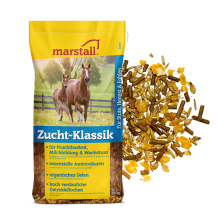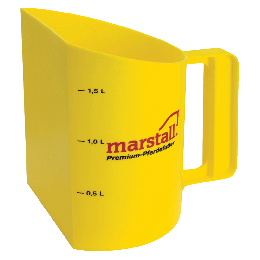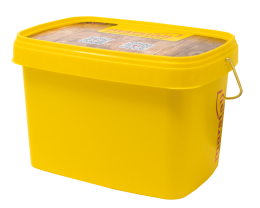Zucht-Klassik
- for fertility, milk production & growth
- essential amino acids
- organic selenium
- highly digestible cereal flakes
marstall Zucht-Klassik combines all the advantages of traditional breeding horse feed. It con-sists of oats, easily digestible, hydrothermally digested cereal flakes, amino acids in pure form and also high-quality protein components and omega-3 fatty acids. The muesli is en-riched with important minerals and trace elements and also contains beta-carotene. Zucht-Klassik has a moderate, easily digestible amount of starch per portion.
Zucht-Klassik, with easily digestible starch, is perfectly adapted to the needs of breeding horses.
With a pure oat and hay/grass diet, broodmares, especially from the 8th month of preg-nancy and in the lactation phase, are often undersupplied. marstall Zucht-Klassik covers the increased energy requirements of the mare with highly digestible, hydrothermally digested cereal flakes, oats and oil containing omega-3 fatty acids. In addition to pure, 100% usable L-lysine, our Zucht-Klassik contains other quality protein components such as soya*** and brewer's yeast with high levels of leucine, methionine and other essential amino acids in pure form. These are necessary for foal growth and for the formation of milk protein. The appropriate supply of calcium, phosphorus, copper, zinc and manganese ensures normal de-velopment of the foal's joints and bones. Organic selenium from selenium yeast improves the vitality and resistance of the unborn foal and later also the milk quality of the brood-mare. Selenium yeast - together with vitamin E and beta-carotene - facilitates the detach-ment of the placenta. It can also support further reproduction. The quality of the colostrum is positively influenced by appropriate doses of zinc and beta-carotene as well as vitamins A and E.
Stud stallions also benefit from being fed marstall Zucht-Klassik. Containing essential amino acids in pure form, selenium, beta-carotene and vitamins A and E, it can improve semen quantity and sperm quality. Our breeding muesli also supports vigour and condition and en-sures a balanced nervous system
Feed supplement for horses
Composition of marstall Zuchtmüsli
Maize flakes (21.00%), barley flakes (19.50%), soybean meal, steamed (15.00%), oats (15.00%), semolina bran (12.00%), maize gluten feed (6.50%), vegetable oil (from rapeseed, refined) (3.00%), beet molasses (3.00%), calcium carbonate (2.00%), brewer’s yeast (1.50%), sodium chloride (0.50%), magnesium oxide (0.25%)
EADCM conform acc. FEI.
Nutritional analysis and energy per kg
| Crude protein | 16.00 % |
| pcd* crude protein | 110.00 g |
| Crude fat | 6.00 % |
| Crude fibre | 5.80 % |
| Crude ash | 6.40 % |
| Energy (DE)** | 12.40 MJ |
| Energy (ME)** | 11.30 MJ |
| Calcium | 0.95 % |
| Phosphorus | 0.45 % |
| Sodium | 0.25 % |
| Magnesium | 0.30% |
| Starch | 32.70 % |
| Sugar | 4.30 % |
Amino acids
| Lysine* | 0.90 % |
| SAS (Methionine + Cysteine)* | 0.40 % |
| Threonine | 0.45 % |
| Leucine* | 0.95 % |
*precaecal digestibility = can be digested in the small intestine = available
**acc. to GfE 2014 (Society for Energy Efficiency)
Nutritional additives per kg
Fat-soluble vitamins
| Vitamin A | 20.000.00 I.E. |
| Beta-Carotin | 50.00 mg |
| Vitamin D3 | 3.200.00 I.E. |
| Vitamin E | 400.00 mg |
| Vitamin K3 | 15.00 mg |
Water-soluble vitamins
| Vitamin C | 100.00 mg |
| Vitamin B1 | 30.00 mg |
| Vitamin B2 | 18.00 mg |
| Vitamin B6/Pyridoxine Hydrochloride | 10.00 mg |
| Vitamin B12/Cyanocobalamin | 120.00 mcg |
| Biotin | 280.00 mcg |
| Folic acid | 8.00 mg |
| Choline chloride | 400.00 mg |
| Calcium D-pantothenate | 35.00 mg |
| Niacin | 70.00 mg |
Trace elements
| Iron as monohydrate iron (II) sulphate | 150.00 mg |
| Copper as copper (II) sulphate pentahydrate | 30.00 mg |
| Copper (II) chelate of glycine hydrate | 15.00 mg |
| Zinc as zinc oxide | 120.00 mg |
| Zinc chelate of glycine hydrate | 60.00 mg |
| Manganese as manganese (II) oxide | 70.00 mg |
| Glycine manganese chelate hydrate | 30.00 mg |
| Iodine as anhydrous calcium iodate | 0.90 mg |
| Selenium as sodium selenite | 0.50 mg |
| Selenium in organic form from Saccharomyces cerevisiae CNCM I-3060 (inactivated selenium-enriched yeast) | 0.30 mg |
Amino acids
| L-Lysine monohydrochloride (technically pure) | 0.30 % |
Fütterungsempfehlung
| ...for stallions **** | not at stud | at stud |
|
|
| 200 to250 g | 300 to450 g | per 100 kg LW/day |
| Sample daily ration for a warmblood stallion | 1.5 kg | 2.0 to3.0 kg |
|
|
|
|
|
|
| … for mares**** | 8th –11 month of pregnancy | before foaling and while lactating |
|
| Increase from 250 g to 400 g | 350 to500 g | per 100 kg LW/day | |
| Sample daily ration for a warmblood mare
| 1.5 to 2.5 kg | 2.0 to 3.0 kg |
|
| Foals | 2 weeks to 11 months | 13 to 36 months |
|
|
| 800 to 500 g | 400 to 250g |
|
| Sample ration per day for a warmblood foal (target weight 600 kg)
| 6 months | 13 to36 months |
|
|
| 1.5 to 1.7 kg | 1 to 1.5 kg |
|
1 litre marstall Zucht-Klassik = approx. 520 grammes
Feeding advice
All given feed quantities should be divided into at least two portions over the course of the day.
****Our recommendations assume a forage intake (hay) of 1.5–2,0 kg per 100 kg live weight per day. For lactating mares, stallions at stud and foals, the hay should ideally be from an early 1st cutting (for lactating mares up to 2.5 kg hay per 100 kg LW/day).
This complementary feed for horses contains higher amounts of trace elements and vitamin D3 compared to complete feeds: feed according to the directions given here! Please follow the feeding directions to provide optimum care for your horse.

Particularly for mares with poor absorption or that are covered during winter time, the feed-ing of additional beta-carotene and high-quality protein around four weeks before covering to the 3rd week of pregnancy is a good idea. After this, the pregnant mare does not need an increased supply of nutrients until the 7th month of pregnancy. From the 8th month of preg-nancy, the foal develops rapidly in the womb, which increases the mare's requirements. The same applies to lactation (suckling phase) after the birth.




